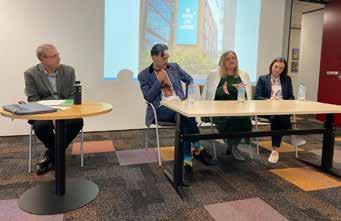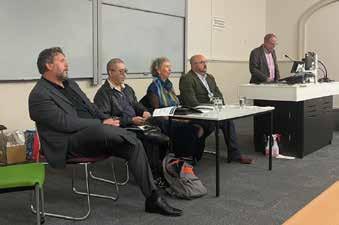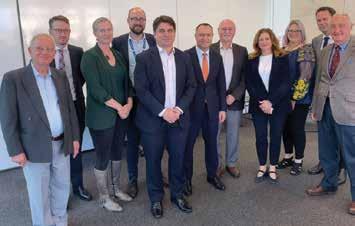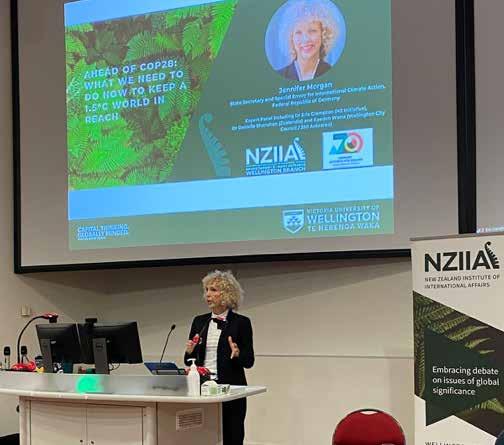
3 minute read
INSTITUTE NOTES
National Office and branch activities
On 14 December a roundtable was held in Wellington on the long-range repercussions of the war in Ukraine with Ukraine’s ambassador to Australia and New Zealand, HE Vasyl Myroshnychenko. NZIIA life member Prof Roberto Rabel moderated the discussion.
Rt Hon Sir Michael Hardie Boys GNZM, GCMG, QSO, an honorary vice president of the NZIIA, died on 29 December. While governor-general from 1996 to 2001, he was patron of the NZIIA.
Board member Suzannah Jessep has been appointed director of the Asia New Zealand Foundation.
NZIIA life member and former Hawke’s Bay branch chair Ken Aldred passed away on 26 January. An obituary is to be found elsewhere in this issue.
Auckland
On 14 November the branch conducted a panel discussion on ‘What You Need to Know About Ukraine: the Past, Present and Future’, moderated by branch chair Prof Rouben Azizian. Kyrylo Cyril Kutcher (Massey University), Prof Natalia Chaban (University of Canterbury) and Associate Prof Olga Dodd (Auckland University of Technology) discussed the history and national identity of Ukraine, the role of media in the Russo-Ukraine War and Ukraine’s economic development and reconstruction.
On 30 November the branch, in conjunction with Massey
University’s Centre for Defence and Security Studies, held a meeting to launch the book State of Threat, The Challenges to Aotearoa New Zealand’s National Security. The launch was followed by a panel discussion moderated by Prof Rouben Azizian with panellists book co-editor Associate Prof Wil Hoverd and chapter authors Associate Prof Damien Rogers, Dr Germana Nicklin and Jose Miguel Alonso-Trabanco, all from Massey University.
On 5 January 2024, several members of the NZIIA Auckland branch executive committee, together with the Pacific Cooperation Foundation, hosted a roundtable on China and regional security with Dr Oriana Skylar Mastro from Stanford University.
Christchurch
On 8 December the branch held a meeting, in conjunction with the Strategic Policy Division for the Ministry of Foreign Affairs and Trade, in conjunction with the University of Canterbury’s Department of Political Science and International Relations, to hear MFAT’s Joanna Anderson and Hannah Miller on ‘Navigating a Shifting World — New Zealand’s Place in a Heightened Geo-strategic Environment’.
Four days later the branch was addressed by David Gehenbeck, deputy chief of mission at the US embassy in Wellington, on ‘United States’ Continued Efforts to Combat Russia’s Illegal War Against Ukraine’.


Nelson
The branch held its annual meeting and Christmas party on 29 November. In his chair’s report Oke Blaikie noted that the branch was in good heart with 70 family members and 47 individual members, with a waiting list of 20 (a limitation that stemmed mainly from the accommodation limitations at the branch’s golf club meeting venue). The nine meetings had seldom less than 90 attending to hear the presentations, some of which he described as ‘absolutely outstanding’. He paid tribute to the efforts of committee members Richard Griffin, Paul and Deborah Willis and Bill Unwin, who had or were about to retire from the committee. Officers elected were:
Chair — Oke Blaikie
Secretary — Gabrielle Hervey
Committee — Judy Finn, John Fitchett, Alison MacAlpine
The following meetings were held:
23 Nov David Melville (ecologist), ‘Diplomatic Godwits’.
25 Jan Sir Malcolm Grant CBE (former non-executive chairman of the National Health Service England), ‘Is Artificial Intelligence Likely to Bring About the End of the World as We Know It — and If So When?’.
22 Feb Rod Oram (journalist), ‘Leader or Laggard? New Zealand’s Foreign Policy in An Era of Global Ecological Crisis’.
Wairarapa
On 30 November Dr Bella Duncan (research fellow, Victoria University’s Antarctic Research Centre) addressed the branch about the recent changes in the Antarctic region and how it is an important part of the growing world-wide climate crisis.
Wellington
On 29 November, the branch hosted Dr Reuben Steff from the University of Waikato, who spoke on the topic ‘Our Region is Now a Strategic Theatre: New Zealand’s Balancing Response to China’.
The branch partnered with the Indian high commission in an end of year event on 5 December showcasing business, tourism and culture with a special focus on three states of India — Assam, Kerala and Uttar Pradesh.
On 14 December, the branch held a Christmas event in collaboration with the McGuinness Institute, a Wellington-based independent and non-partisan New Zealand think-tank, for the launch of its fifth edition of Nation Dates: Timelines of significant events
Addendum
The text below was inadvertently omitted from Prof Reuben Azizian’s article in the last issue (vol 49, no 1): Postscript: The current crisis in Gaza is a vivid example of how the principles of territorial security and selfdetermination have violently clashed again. There is no evidence of the direct impact of the Russo-Ukraine War on the Gaza confrontation, but some parallels in the two situations are obvious.
that have shaped the history of Aotearoa New Zealand. This book, which now includes 857 entries, beginning in 1769, is traditionally distributed to members of Parliament. At the event, attended by ambassadors and other members of the Wellington diplomatic community, McGuiness Institute chief executive and founder Wendy McGuinness talked about the book, followed by lunch and networking. The book is being distributed to Wellington diplomatic missions and is available to order from https://nationdatesnz.org.


Correction
An editorial glitch led to US President Franklin Delano Roosevelt being wrongly depicted as Theodore Roosevelt in Stephen Harris’s review article, ‘The view from behind the curtain’, in the last issue (vol 49, no 1, p.19).









